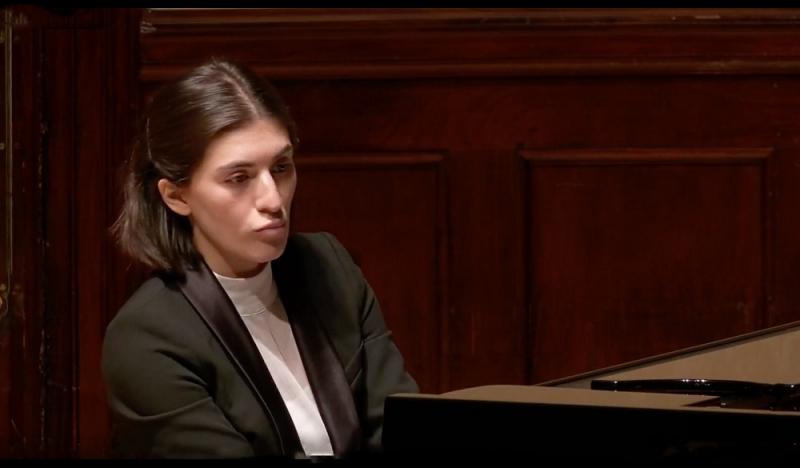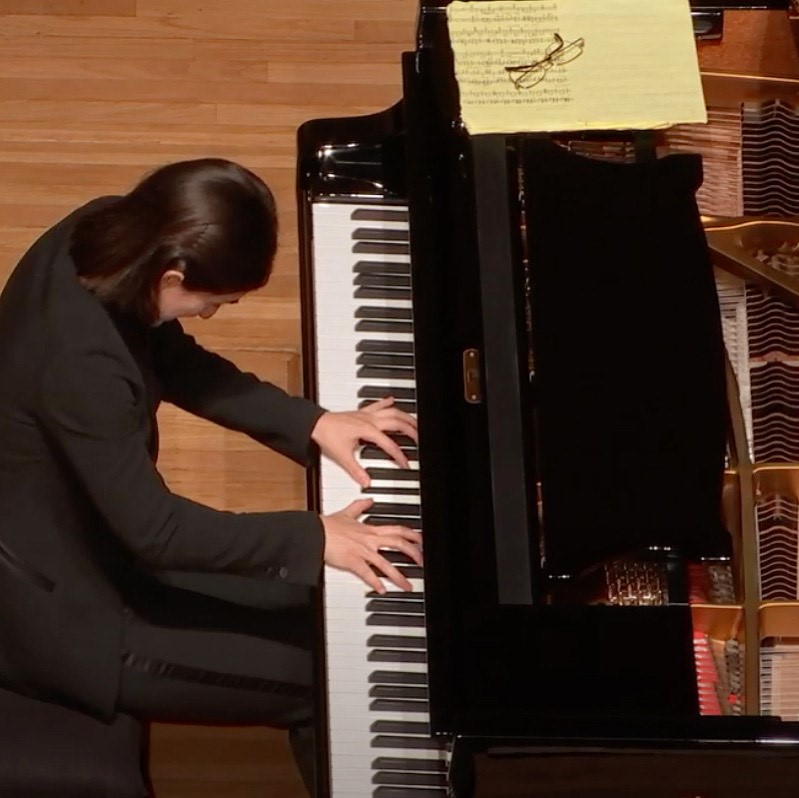Mariam Batsashvili, Wigmore Hall review – the serious virtuoso | reviews, news & interviews
Mariam Batsashvili, Wigmore Hall review – the serious virtuoso
Mariam Batsashvili, Wigmore Hall review – the serious virtuoso
An intriguing recital from a strikingly impressive young artist

“O wise young judge”, says Shylock to Portia in The Merchant of Venice.It seemed just such a figure who made her way to the piano at the Wigmore Hall last night.
One of BBC Radio 3’s New Generation Artists for 2017/18, Batsashvili is an uncommon musician and I suspect could become still more so as time goes by. Her programme was unusual and attractive, opening with the mesmerically gorgeous and unaccountably rare Prélude, Fugue et variation by Franck, creating the rapt atmosphere from the first note. There followed Ravel’s iridescent Sonatine – pure “un coeur en hiver” territory in which her clarity of touch allowed the composer’s icy poetic world to shiver, whirl and gleam.
The first of the two virtuoso operatic fantasias to punctuate the recital was Thalberg’s Grand Caprice on Bellini’s La Sonnambula, quite a rarity, since most pianists, if taking to operatic fantasias, plump for the more famous examples by Liszt. Batsashvili delivered this pianistic razzle-dazzle with high seriousness, the instrument singing full-throated under her fingers: and even if the work isn’t quite a neglected masterpiece, not everything needs to be one in order to prove simply enjoyable and impressive.
 Schumann’s Fantasiestücke Op. 12 often lose out in recital programmes (in normal times…) with pianists tackling the composer’s bigger structures in preference to “miniatures” – but there’s nothing miniature about the scale and range of his imagination. Batsashvili rose to the challenge of creating a different soundworld for each of the pieces, from the stillness and purity of “Des Abends” to the headlong, on-the-edge tempo of “Traumes Wirren”; there was nothing “safe” about this playing, but some brief lapses of memory never upset her equanimity.
Schumann’s Fantasiestücke Op. 12 often lose out in recital programmes (in normal times…) with pianists tackling the composer’s bigger structures in preference to “miniatures” – but there’s nothing miniature about the scale and range of his imagination. Batsashvili rose to the challenge of creating a different soundworld for each of the pieces, from the stillness and purity of “Des Abends” to the headlong, on-the-edge tempo of “Traumes Wirren”; there was nothing “safe” about this playing, but some brief lapses of memory never upset her equanimity.
Finally, though, the metaphorical gloves came off. Liszt’s goloptious Paraphrase on a Waltz from Gounod’s Faust found Batsashvili bounding around the keyboard as if back in her own front room, a spring in her step, the windows wide open and the sun blaring in through those relishable glissandi. It was with Liszt that Batsashvili first came to prominence, winning the 2014 Franz Liszt Piano Competition in Utrecht; several times she has picked his Piano Concerto No. 1 for important debuts, and in interviews she has expressed continuing devotion to his music. Some might find this surprising home territory for such a refreshingly serious artist, but the much-garlanded Gounod waltz was all the more fun for what went before, and I’d defy any toe not to find itself tapping along.
Her encore was Rossini’s Petit Caprice (Style Offenbach) – ballet fans would recognise it as the can-can from La boutique fantasque – delivered with unflappable aplomb and, finally, some smiles. She’s a rare and special performer and I can’t wait to see where she goes from here.
rating
Explore topics
Share this article
The future of Arts Journalism
You can stop theartsdesk.com closing!
We urgently need financing to survive. Our fundraising drive has thus far raised £49,000 but we need to reach £100,000 or we will be forced to close. Please contribute here: https://gofund.me/c3f6033d
And if you can forward this information to anyone who might assist, we’d be grateful.

Subscribe to theartsdesk.com
Thank you for continuing to read our work on theartsdesk.com. For unlimited access to every article in its entirety, including our archive of more than 15,000 pieces, we're asking for £5 per month or £40 per year. We feel it's a very good deal, and hope you do too.
To take a subscription now simply click here.
And if you're looking for that extra gift for a friend or family member, why not treat them to a theartsdesk.com gift subscription?
more Classical music
 Jakub Hrůša and Friends in Concert, Royal Opera review - fleshcreep in two uneven halves
Bartók kept short, and a sprawling Dvořák choral ballad done as well as it could be
Jakub Hrůša and Friends in Concert, Royal Opera review - fleshcreep in two uneven halves
Bartók kept short, and a sprawling Dvořák choral ballad done as well as it could be
 Monteverdi Choir, ORR, Heras-Casado, St Martin-in-the-Fields review - flames of joy and sorrow
First-rate soloists, choir and orchestra unite in a blazing Mozart Requiem
Monteverdi Choir, ORR, Heras-Casado, St Martin-in-the-Fields review - flames of joy and sorrow
First-rate soloists, choir and orchestra unite in a blazing Mozart Requiem
 Cho, LSO, Pappano, Barbican review - finely-focused stormy weather
Chameleonic Seong-Jin Cho is a match for the fine-tuning of the LSO’s Chief Conductor
Cho, LSO, Pappano, Barbican review - finely-focused stormy weather
Chameleonic Seong-Jin Cho is a match for the fine-tuning of the LSO’s Chief Conductor
 Classical CDs: Shrouds, silhouettes and superstition
Cello concertos, choral collections and a stunning tribute to a contemporary giant
Classical CDs: Shrouds, silhouettes and superstition
Cello concertos, choral collections and a stunning tribute to a contemporary giant
 Appl, Levickis, Wigmore Hall review - fun to the fore in cabaret and show songs
A relaxed evening of light-hearted fare, with the accordion offering unusual colours
Appl, Levickis, Wigmore Hall review - fun to the fore in cabaret and show songs
A relaxed evening of light-hearted fare, with the accordion offering unusual colours
 Lammermuir Festival 2025, Part 2 review - from the soaringly sublime to the zoologically ridiculous
Bigger than ever, and the quality remains astonishingly high
Lammermuir Festival 2025, Part 2 review - from the soaringly sublime to the zoologically ridiculous
Bigger than ever, and the quality remains astonishingly high
 BBC Proms: Ehnes, Sinfonia of London, Wilson review - aspects of love
Sensuous Ravel, and bittersweet Bernstein, on an amorous evening
BBC Proms: Ehnes, Sinfonia of London, Wilson review - aspects of love
Sensuous Ravel, and bittersweet Bernstein, on an amorous evening
 Presteigne Festival 2025 review - new music is centre stage in the Welsh Marches
Music by 30 living composers, with Eleanor Alberga topping the bill
Presteigne Festival 2025 review - new music is centre stage in the Welsh Marches
Music by 30 living composers, with Eleanor Alberga topping the bill
 Lammermuir Festival 2025 review - music with soul from the heart of East Lothian
Baroque splendour, and chamber-ensemble drama, amid history-haunted lands
Lammermuir Festival 2025 review - music with soul from the heart of East Lothian
Baroque splendour, and chamber-ensemble drama, amid history-haunted lands
 BBC Proms: Steinbacher, RPO, Petrenko / Sternath, BBCSO, Oramo review - double-bill mixed bag
Young pianist shines in Grieg but Bliss’s portentous cantata disappoints
BBC Proms: Steinbacher, RPO, Petrenko / Sternath, BBCSO, Oramo review - double-bill mixed bag
Young pianist shines in Grieg but Bliss’s portentous cantata disappoints
 theartsdesk at the Lahti Sibelius Festival - early epics by the Finnish master in context
Finnish heroes meet their Austro-German counterparts in breathtaking interpretations
theartsdesk at the Lahti Sibelius Festival - early epics by the Finnish master in context
Finnish heroes meet their Austro-German counterparts in breathtaking interpretations
 Classical CDs: Sleigh rides, pancakes and cigars
Two big boxes, plus new music for brass and a pair of clarinet concertos
Classical CDs: Sleigh rides, pancakes and cigars
Two big boxes, plus new music for brass and a pair of clarinet concertos

Add comment